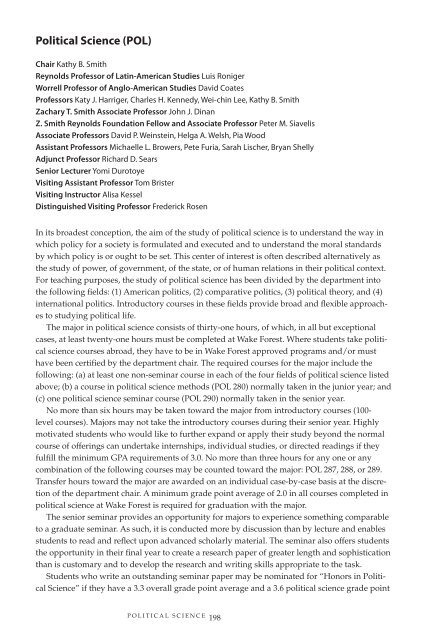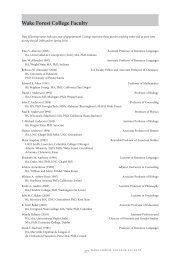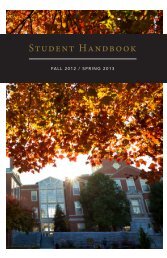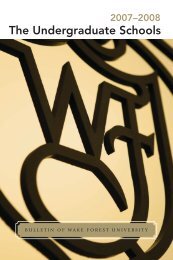theundergraduateschoo ls - Wake Forest University
theundergraduateschoo ls - Wake Forest University
theundergraduateschoo ls - Wake Forest University
Create successful ePaper yourself
Turn your PDF publications into a flip-book with our unique Google optimized e-Paper software.
Political Science (POL)<br />
Chair Kathy B. Smith<br />
Reynolds Professor of Latin-American Studies Luis Roniger<br />
Worrell Professor of Anglo-American Studies David Coates<br />
Professors Katy J. Harriger, Charles H. Kennedy, Wei-chin Lee, Kathy B. Smith<br />
Zachary T. Smith Associate Professor John J. Dinan<br />
Z. Smith Reynolds Foundation Fellow and Associate Professor Peter M. Siavelis<br />
Associate Professors David P. Weinstein, Helga A. We<strong>ls</strong>h, Pia Wood<br />
Assistant Professors Michaelle L. Browers, Pete Furia, Sarah Lischer, Bryan Shelly<br />
Adjunct Professor Richard D. Sears<br />
Senior Lecturer Yomi Durotoye<br />
Visiting Assistant Professor Tom Brister<br />
Visiting Instructor Alisa Kessel<br />
Distinguished Visiting Professor Frederick Rosen<br />
In its broadest conception, the aim of the study of political science is to understand the way in<br />
which policy for a society is formulated and executed and to understand the moral standards<br />
by which policy is or ought to be set. This center of interest is often described alternatively as<br />
the study of power, of government, of the state, or of human relations in their political context.<br />
For teaching purposes, the study of political science has been divided by the department into<br />
the following fields: (1) American politics, (2) comparative politics, (3) political theory, and (4)<br />
international politics. Introductory courses in these fields provide broad and flexible approaches<br />
to studying political life.<br />
The major in political science consists of thirty-one hours, of which, in all but exceptional<br />
cases, at least twenty-one hours must be completed at <strong>Wake</strong> <strong>Forest</strong>. Where students take political<br />
science courses abroad, they have to be in <strong>Wake</strong> <strong>Forest</strong> approved programs and/or must<br />
have been certified by the department chair. The required courses for the major include the<br />
following: (a) at least one non-seminar course in each of the four fields of political science listed<br />
above; (b) a course in political science methods (POL 280) normally taken in the junior year; and<br />
(c) one political science seminar course (POL 290) normally taken in the senior year.<br />
No more than six hours may be taken toward the major from introductory courses (100level<br />
courses). Majors may not take the introductory courses during their senior year. Highly<br />
motivated students who would like to further expand or apply their study beyond the normal<br />
course of offerings can undertake internships, individual studies, or directed readings if they<br />
fulfill the minimum GPA requirements of 3.0. No more than three hours for any one or any<br />
combination of the following courses may be counted toward the major: POL 287, 288, or 289.<br />
Transfer hours toward the major are awarded on an individual case-by-case basis at the discretion<br />
of the department chair. A minimum grade point average of 2.0 in all courses completed in<br />
political science at <strong>Wake</strong> <strong>Forest</strong> is required for graduation with the major.<br />
The senior seminar provides an opportunity for majors to experience something comparable<br />
to a graduate seminar. As such, it is conducted more by discussion than by lecture and enables<br />
students to read and reflect upon advanced scholarly material. The seminar a<strong>ls</strong>o offers students<br />
the opportunity in their final year to create a research paper of greater length and sophistication<br />
than is customary and to develop the research and writing skil<strong>ls</strong> appropriate to the task.<br />
Students who write an outstanding seminar paper may be nominated for “Honors in Political<br />
Science” if they have a 3.3 overall grade point average and a 3.6 political science grade point<br />
P O L I T I C A L S C I E N C E 198






